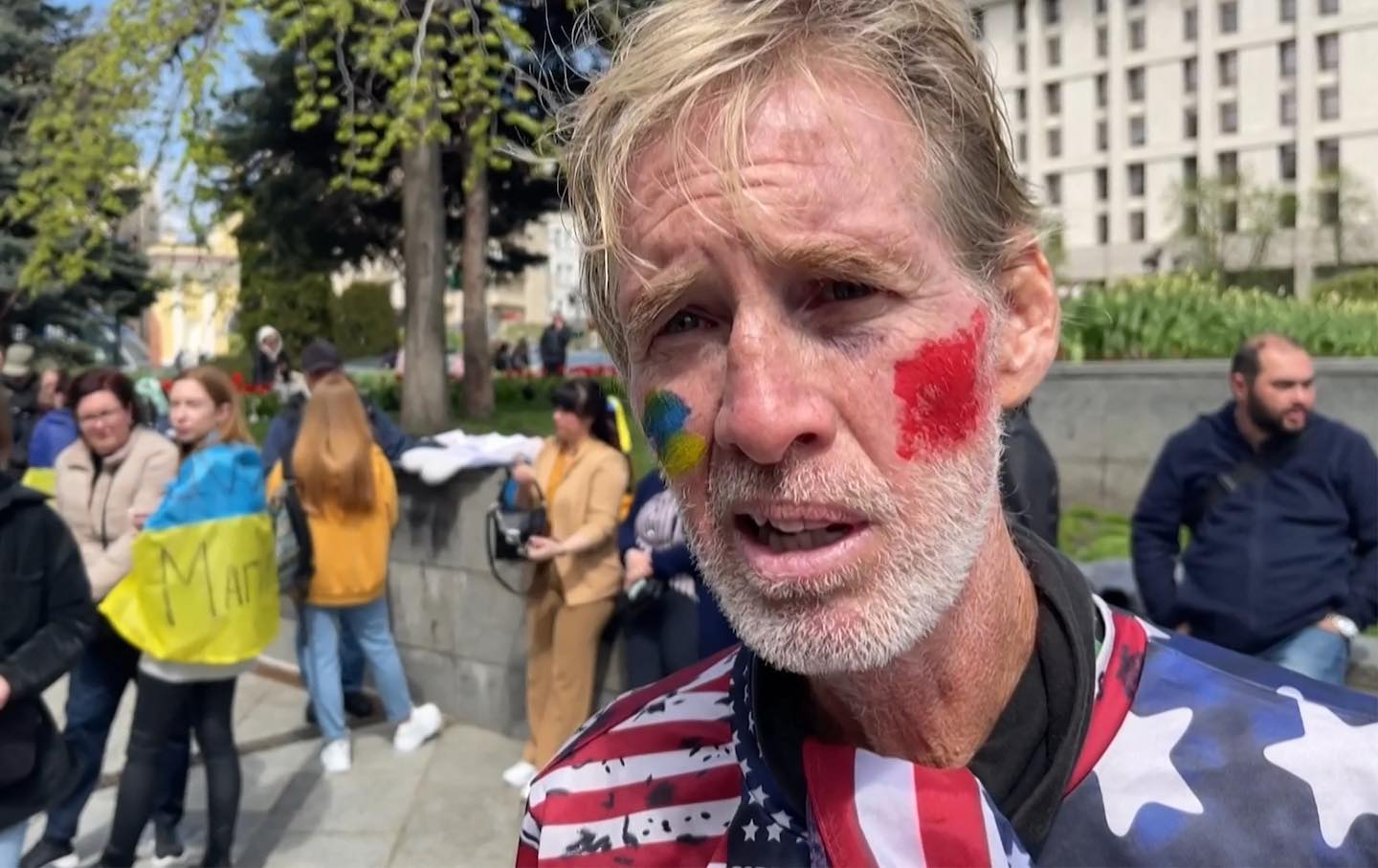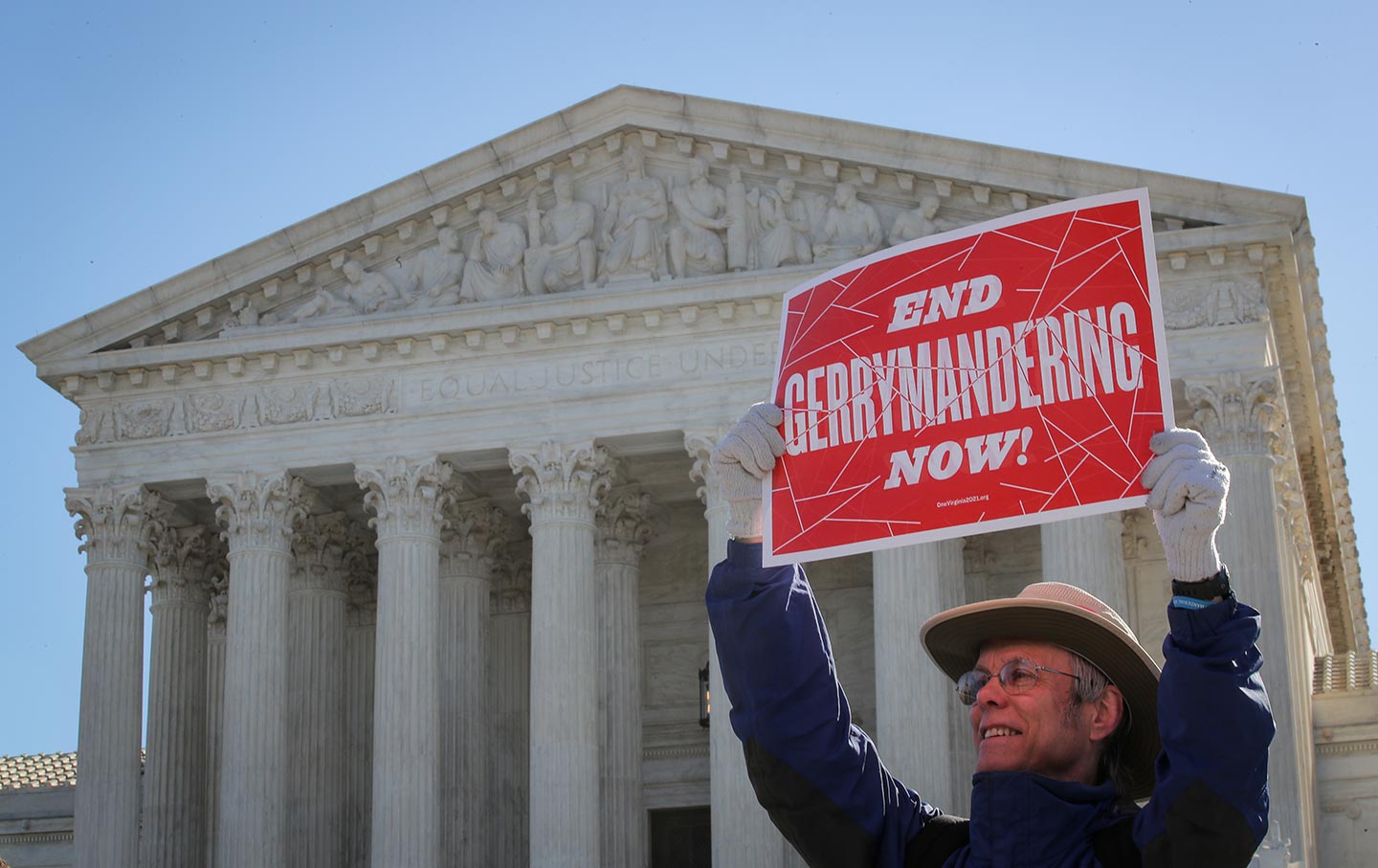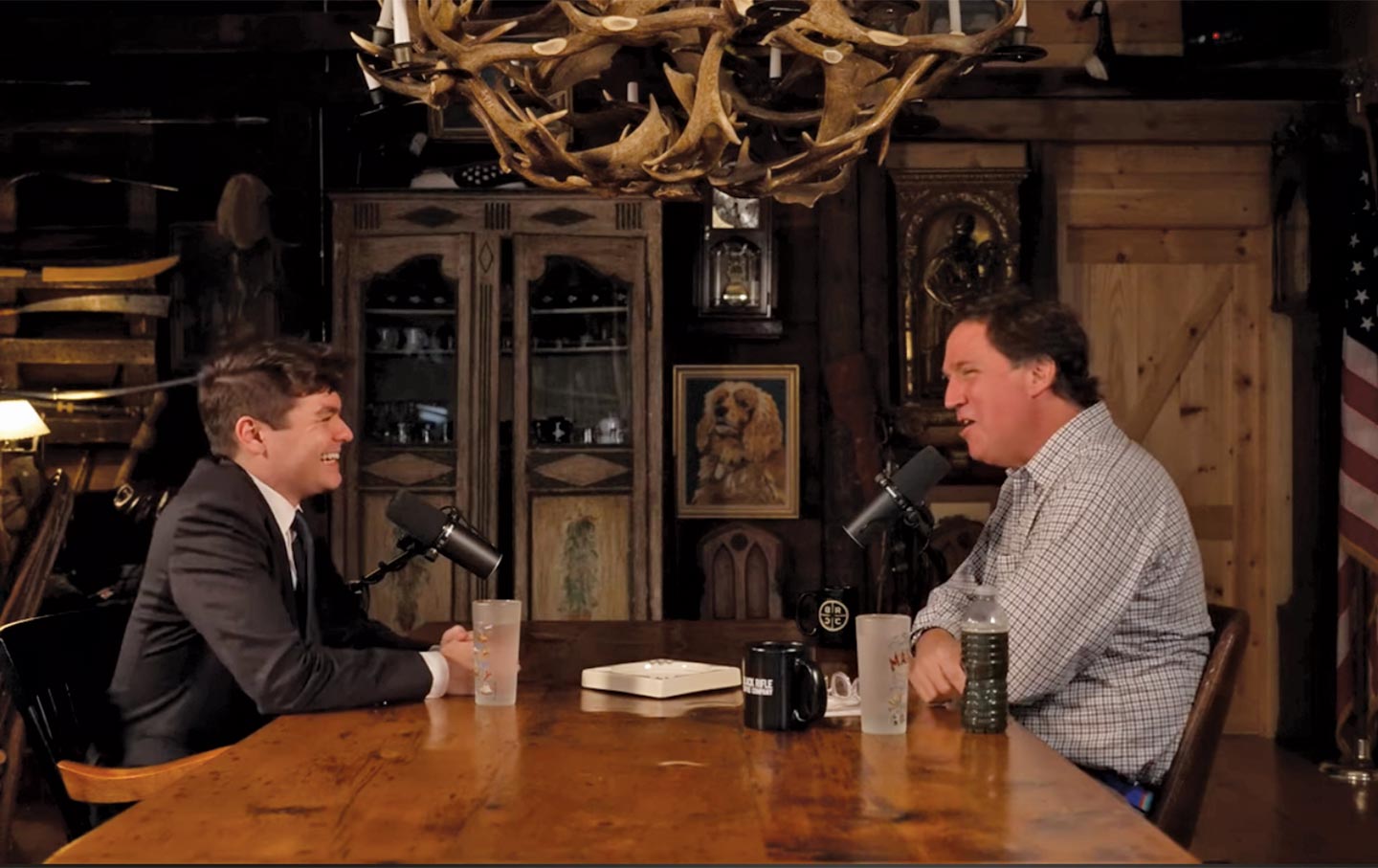The Futile Search for Political Motives in the Second Trump Assassination Attempt
Both Democrats and Republicans claim Ryan Wesley Routh belongs to the other side. But his beliefs are incoherent—and all too American.

A still from AFPTV on September 16, 2024, shows Ryan Wesley Routh at a rally to urge foreign leaders and international organizations to help provide humanitarian corridors for the evacuation of civilians and Ukrainian servicemen from Mariupol amid Russia’s invasion of Ukraine.
(AFPTV / AFP)
If a team of laboratory scientists were working round the clock to develop a life-form that encapsulated the political incoherence of would-be assassins, it’s hard to see how they could improve on Ryan Wesley Routh, the suspect apprehended after an abortive attempt on former president Donald Trump’s life at Trump’s Florida golf course. As the basic elements of Routh’s recent life story come into view, it’s hard to ascribe any clear political through line to it. He voted for Trump in the 2016 election, was enamored of Tulsi Gabbard in 2020, and spent most of the pandemic as a Covid truther. Most recently, he entertained fond reveries of a Nikki Haley–Vivek Ramaswamy ticket, which represents an unlikely fusion not only of two former presidential hopefuls who despise each other, but also an impossible coalition. The two candidates respectively represented a flailing GOP establishment’s perennial effort to distance itself from Trump and a bid to repurpose Trumpism into a permanent revolution administered by the American tech-investment elite. Even in today’s Republican Party, it’s unlikely that Routh, a lifelong construction worker who was apparently living in Hawaii after several decades in North Carolina, would have found himself in demand as a political consultant. (Routh also cast a Democratic ballot in North Carolina’s most recent open primary, and made a number of small donations to Act Blue after 2019, totaling $140.)
In some ways, Routh’s wild-swinging political sympathies proved weirdly prophetic: Gabbard, after all, is now an eager Trump supporter. But even that shift doesn’t square with Routh’s most ardent political obsession: support for Ukraine in its battle against the 2022 Russian invasion. In a 2023 interview with The New York Times for an article about Americans volunteering for the Ukrainian war effort, Routh said he had traveled to the country to try to enlist Afghan soldiers to fight in the war, and that he was prepared to “fight and die” for the cause of Ukrainian independence. Suffice it to say, that is not the position of Gabbard, whom Hillary Clinton famously denounced as a Russian asset during the 2020 presidential campaign, and who is firmly aligned with Trump’s own Putin-first worldview, particularly on the Ukraine war. In a self-published book called Ukraine’s Unwinnable War, Routh wrote that Iran would be justified in assassinating Trump, in part for his repudiation of the Obama administration’s nuclear deal with the country. He also called for the assassinations of Putin and Belarusian Aleksandr President Lukashenko, and urged the United States to precipitate a nuclear confrontation with Russia. In the same tract, he wrote, “I get so tired of people asking if I am a Democrat or a Republican, as I refuse to be put in a category.”
It’s unlikely that Routh’s wish will be honored anytime soon. Right-wing news outlets are already claiming that Routh’s Mad Libs pronouncements about the nation’s politics “echoed” Democratic anti-Trump rhetoric—and Trump himself took up the same refrain as he launched a new bout of fundraising on the thwarted attempt on his life. Never mind that this is a theory of discursive influence right up there with the notion that dire prophecies are contained in backward-playing Beatles records; the claim feeds directly into the elevation of Trump into the status of movement martyr in the 2024 campaign, and will likely only gather greater force as Election Day draws nigh. Meanwhile, liberal commentators, not surprisingly, have downplayed Routh’s Trump-baiting outbursts and stressed the violent strains of MAGA rhetoric, while properly insisting that highlighting Trump’s real and present threat to American democracy is not an incitement to political violence.
Yet it’s hard not to think that this scrum for partisan advantage in interpreting Routh’s unhinged actions and thought processes misses a good deal of the larger point. Trump’s earlier aspiring assassin, Thomas Matthew Crooks, came from a right-leaning political background, but so far very little is known about his possible motivations, particularly since he was killed at the scene of the assassination attempt. But Crooks, like Routh, seemed to harbor an outsize image of the role he was destined to play in world affairs—an all too familiar strain of thinking among political gunmen, from John Wilkes Booth to Lee Harvey Oswald to Arthur Bremer. For most of these figures—with the notable exception of Booth—ideology tends to be something of an afterthought, and certainly not the primary focus. The fantasies of assassins, successful or otherwise, mostly hinge on the craving to lurch with a single blow from fringe obscurity to the center stage of world-shaping historical agency.
In Routh’s case, this reverie was apparently filtered through a far more common and respectable form of violent fantasy—that of the wised-up solitary warrior defending America’s true interests in a dark and hazardous global order. There’s no evidence that he actually took up arms on Ukraine’s behalf while he cosplayed as a member of the conflict’s international brigade, but he clearly felt that the stakes of the conflict—which he repeatedly referenced as a fundamental confrontation of “good and evil”—licensed any and all forms of violent response, up to and including nuclear war. That extremity is thankfully not part of the diplomatic framework in the Ukraine war—though with US missile shipments to Ukraine poised to target installations deeper in Russia, that’s not as steadfast a guarantee as it should be. In the wake of Routh’s arrest, as in the case of Crooks’s June assassination attempt, we’ve seen a chorus of political leaders and policy intellectuals rush to assure us that our country settles political differences by ballots, not bullets. Yet in the theaters of conflict that Routh himself was drawn into, that is decidedly not so.
Just as his actions in Florida were presaged by a prior history of lethal weapons offenses, so were Routh’s geopolitical delusions fed by generations of American regime-change follies carried out at gunpoint. Instead of looking to Republican or Democratic messaging complexes for the last word on Routh’s demented golf-course assault, we might better heed the wisdom of Mick Jagger, seeking to finger the culprits of the most notorious assassinations of the 1960s: After all, it was you and me.
Disobey authoritarians, support The Nation
Over the past year you’ve read Nation writers like Elie Mystal, Kaveh Akbar, John Nichols, Joan Walsh, Bryce Covert, Dave Zirin, Jeet Heer, Michael T. Klare, Katha Pollitt, Amy Littlefield, Gregg Gonsalves, and Sasha Abramsky take on the Trump family’s corruption, set the record straight about Robert F. Kennedy Jr.’s catastrophic Make America Healthy Again movement, survey the fallout and human cost of the DOGE wrecking ball, anticipate the Supreme Court’s dangerous antidemocratic rulings, and amplify successful tactics of resistance on the streets and in Congress.
We publish these stories because when members of our communities are being abducted, household debt is climbing, and AI data centers are causing water and electricity shortages, we have a duty as journalists to do all we can to inform the public.
In 2026, our aim is to do more than ever before—but we need your support to make that happen.
Through December 31, a generous donor will match all donations up to $75,000. That means that your contribution will be doubled, dollar for dollar. If we hit the full match, we’ll be starting 2026 with $150,000 to invest in the stories that impact real people’s lives—the kinds of stories that billionaire-owned, corporate-backed outlets aren’t covering.
With your support, our team will publish major stories that the president and his allies won’t want you to read. We’ll cover the emerging military-tech industrial complex and matters of war, peace, and surveillance, as well as the affordability crisis, hunger, housing, healthcare, the environment, attacks on reproductive rights, and much more. At the same time, we’ll imagine alternatives to Trumpian rule and uplift efforts to create a better world, here and now.
While your gift has twice the impact, I’m asking you to support The Nation with a donation today. You’ll empower the journalists, editors, and fact-checkers best equipped to hold this authoritarian administration to account.
I hope you won’t miss this moment—donate to The Nation today.
Onward,
Katrina vanden Heuvel
Editor and publisher, The Nation








